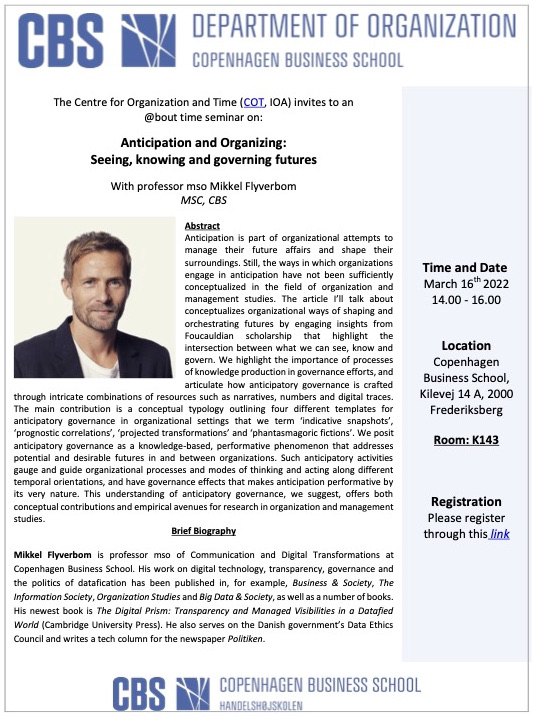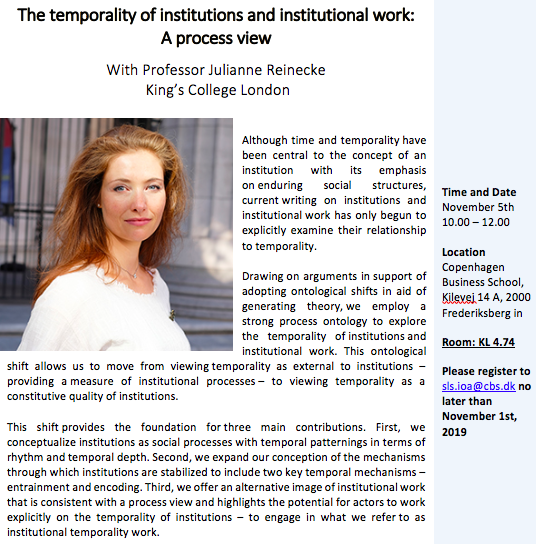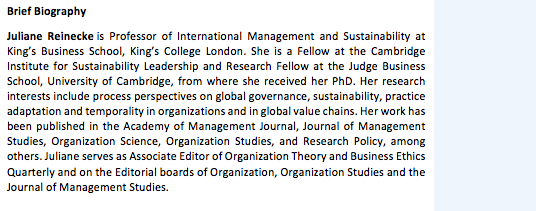Centre for Organization and Time (COT)
Archive
Nina Granqvist - @bout time seminar - January 18th "Chasing tornadoes: Temporal Work to Foster Group Engagement Under Uncertainty"
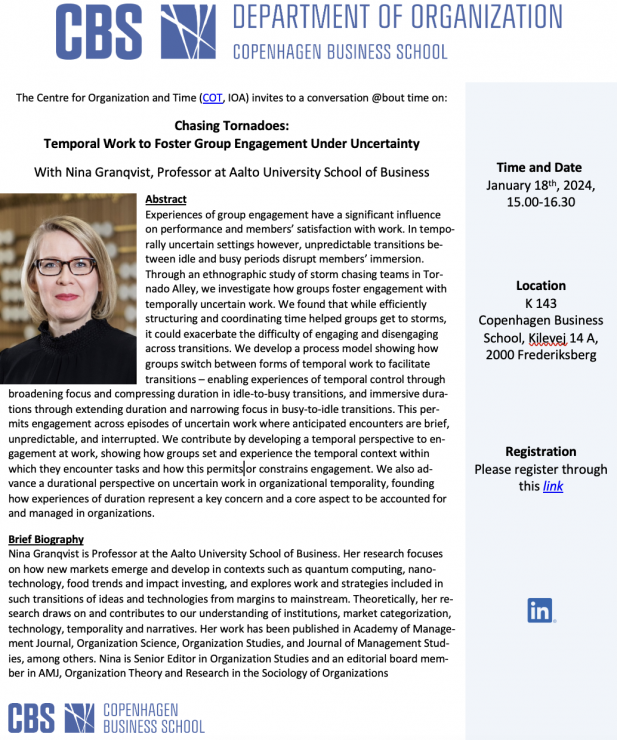
Jeroen Oomen - @bout time seminar - February 5th 2024 "Capturing futures: Temporality in the Drama of Environmental Politics"

Jörg Sydow - @bout time seminar - November 8th "Temporary Organizing: Form and Process

Lasse Jonasson - @bout time seminar - September 12th "Anticipatory Leadership: How to lead your organization in times of uncertainty and complexity
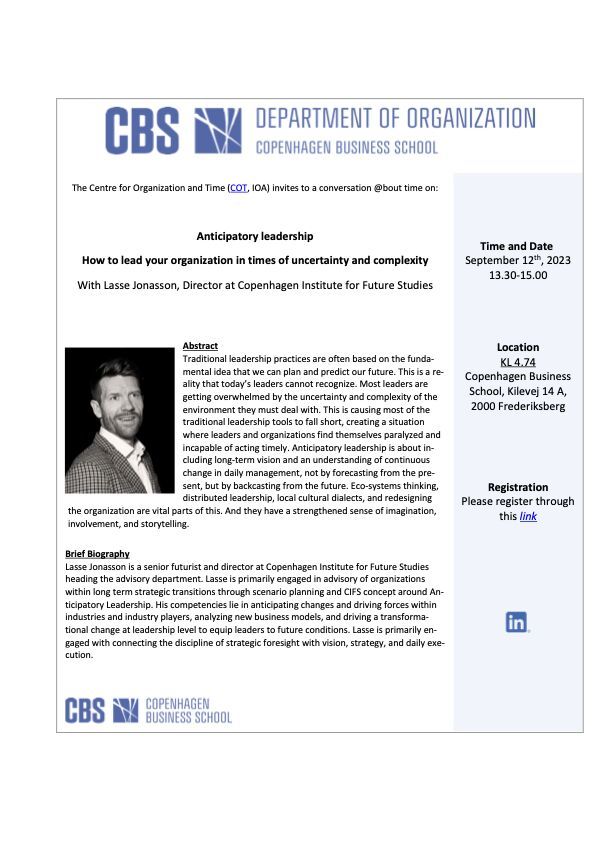
Stefan Gaardsmand Jacobsen - @bout time seminar - April 18th "Between Sequence and Urgency: Climate Justice Temporalities in Denmark"
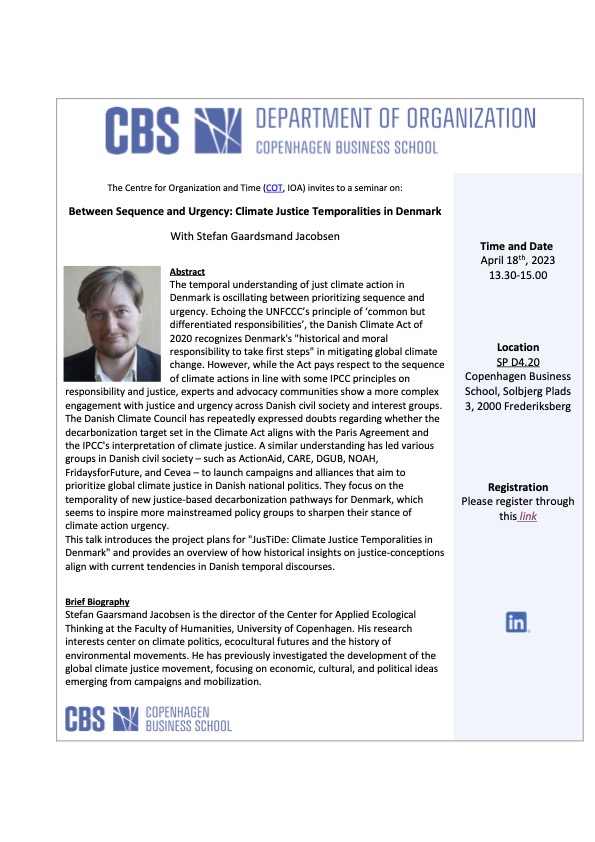
Graham Winch - @bout time seminar - March 10th "From Temporary to Temporal Organizing: An intellectual Journey"
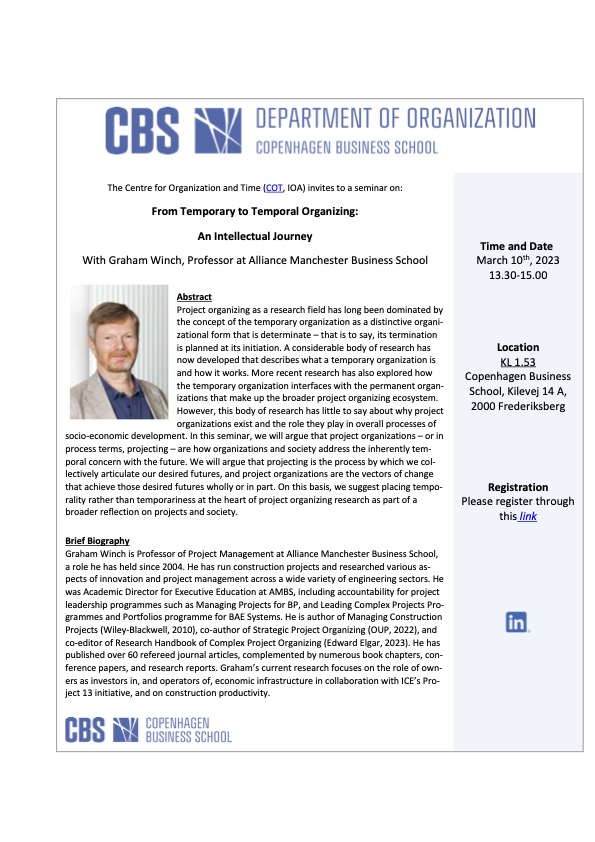
2022
Peter Møllgaard - @bout time seminar
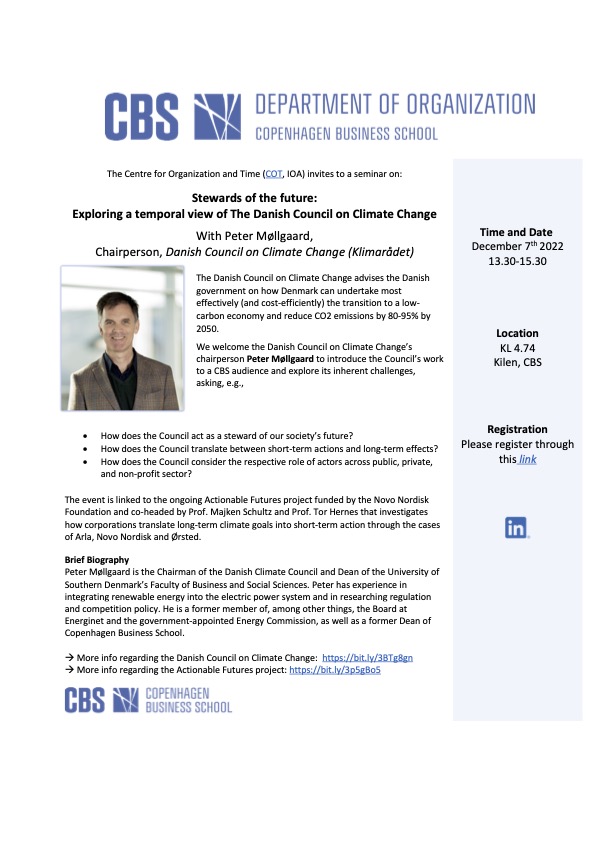
Emanuel Gomez - @bout Time Seminar
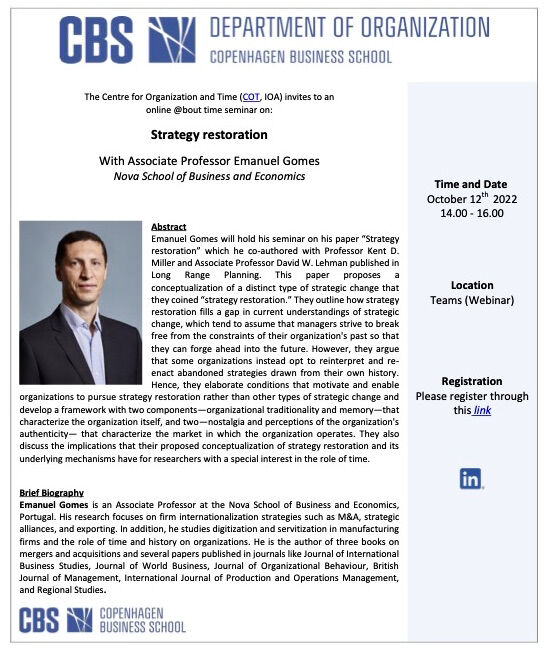
Elena Giovannoni - @bout Time Seminar
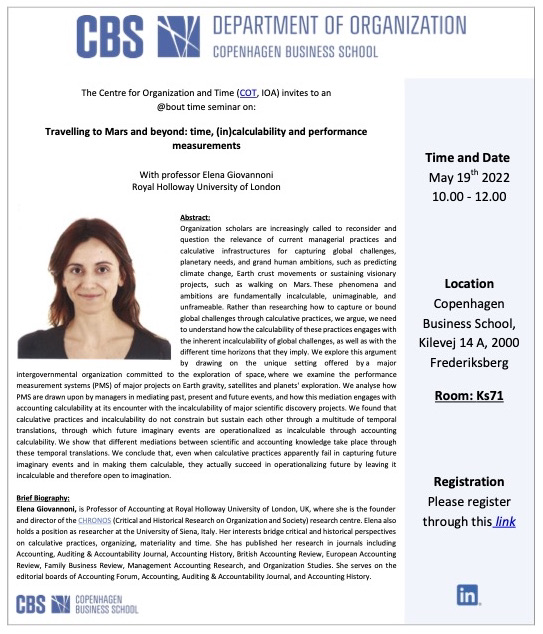
Tammar B. Zilber - @bout Time Seminar
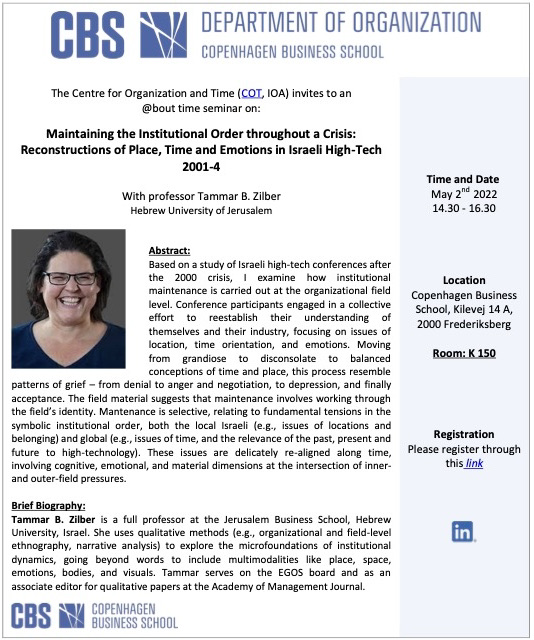
Jochen Koch - @bout Time Seminar
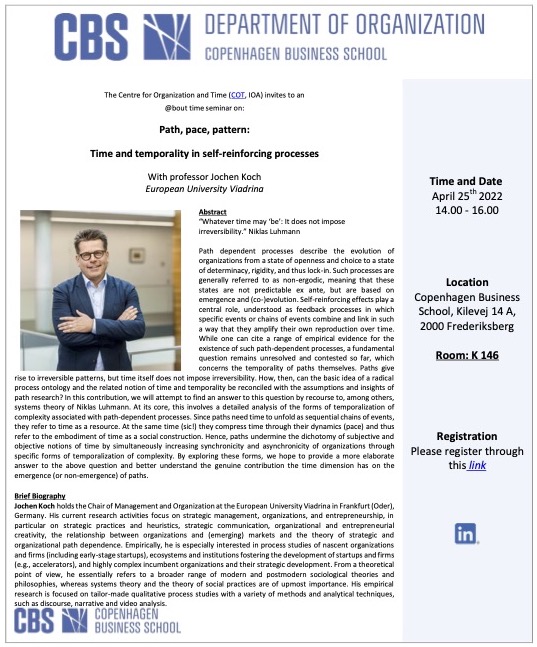
Mikkel Flyverbom - @bout Time Seminar
2021
Liisa Välikangas - @bout Time Seminar
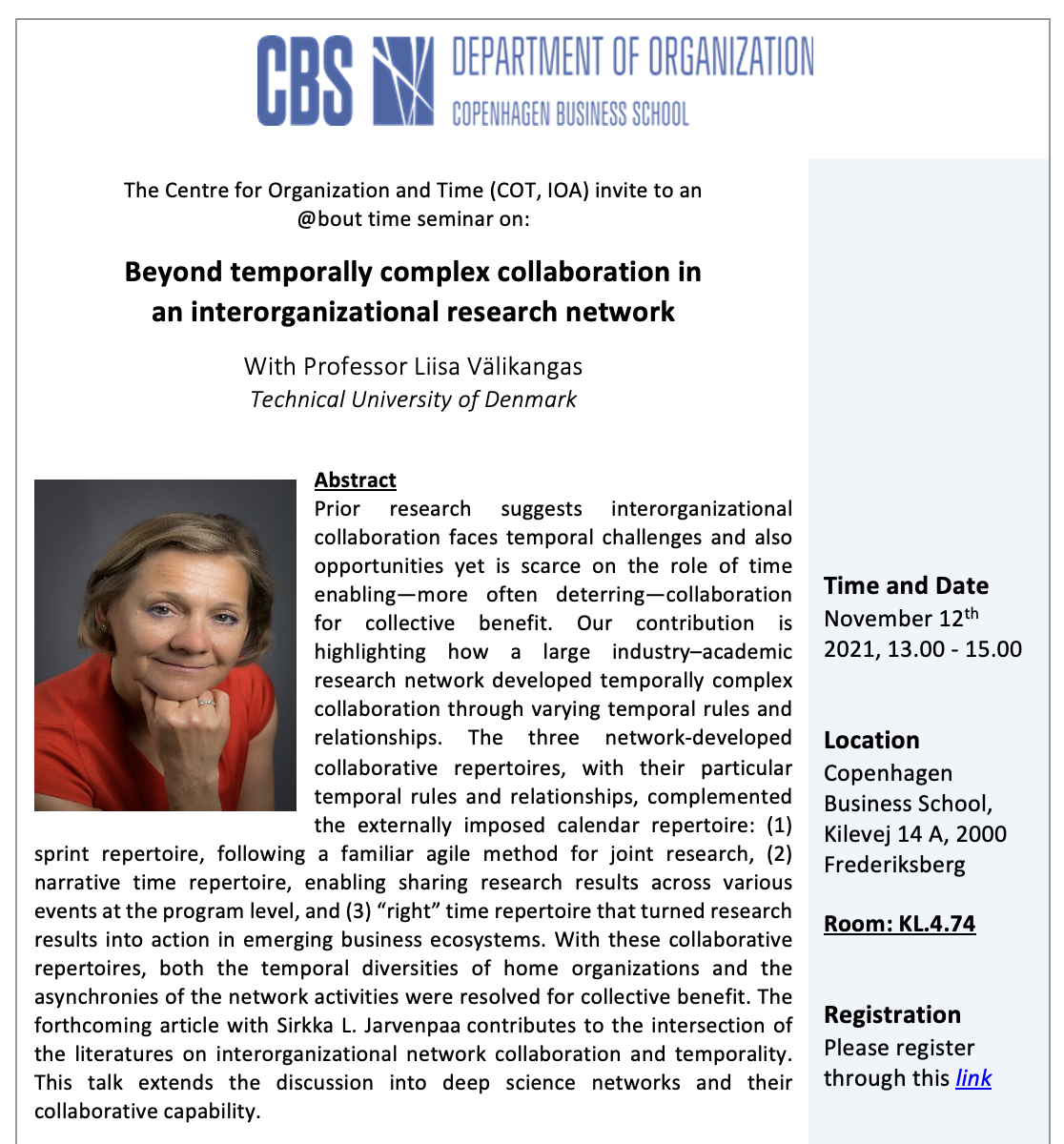
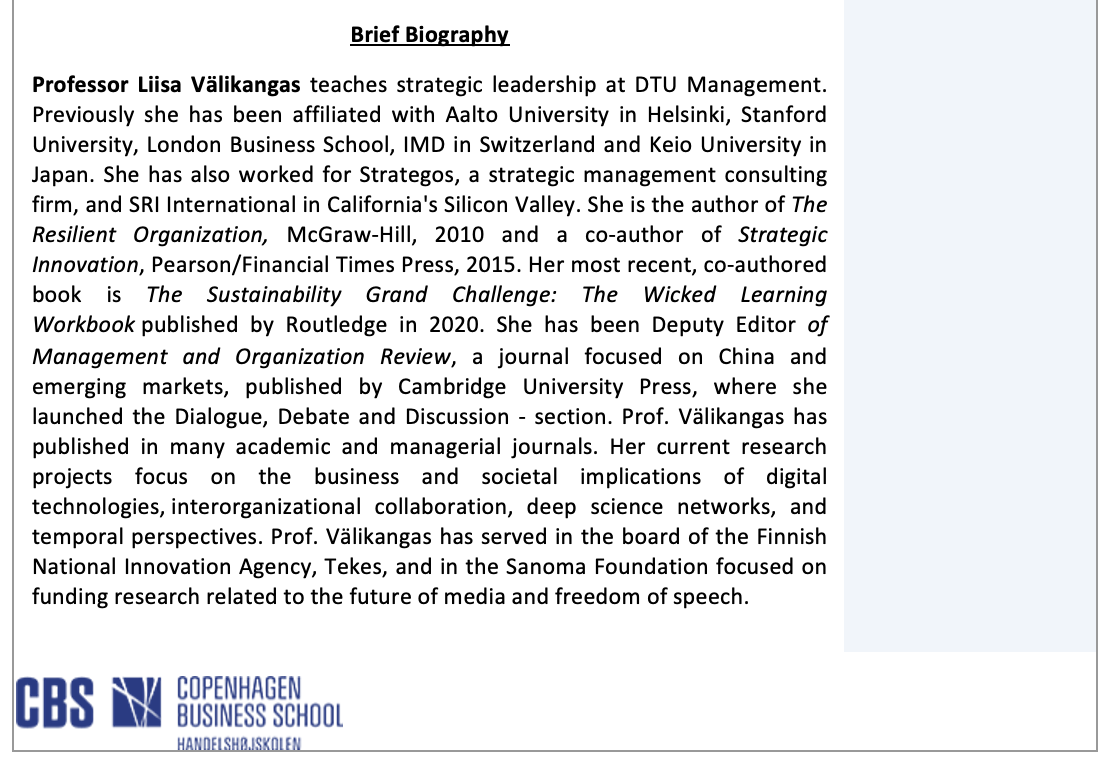
CrossRoads seminar - October 8th 2021
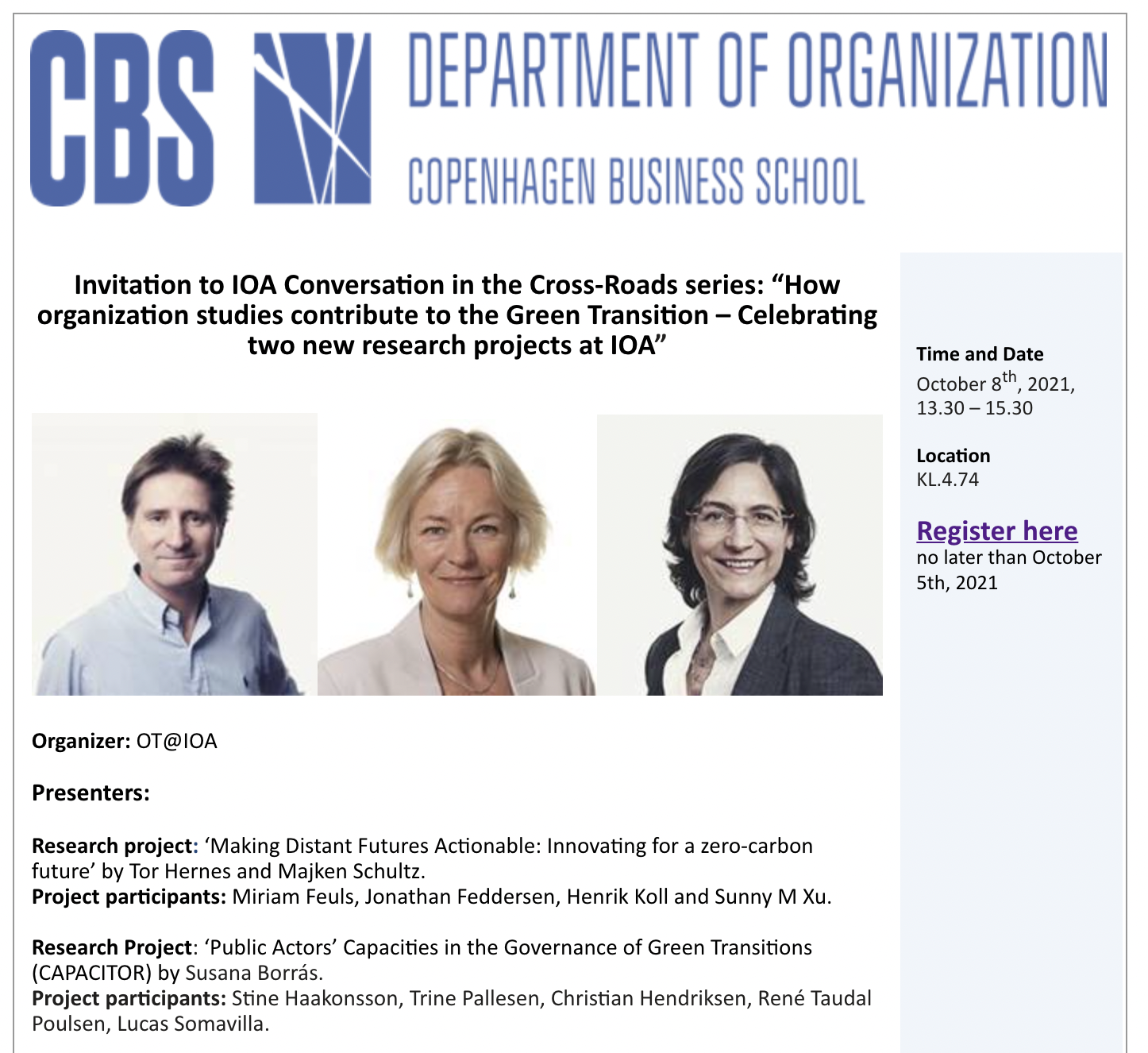
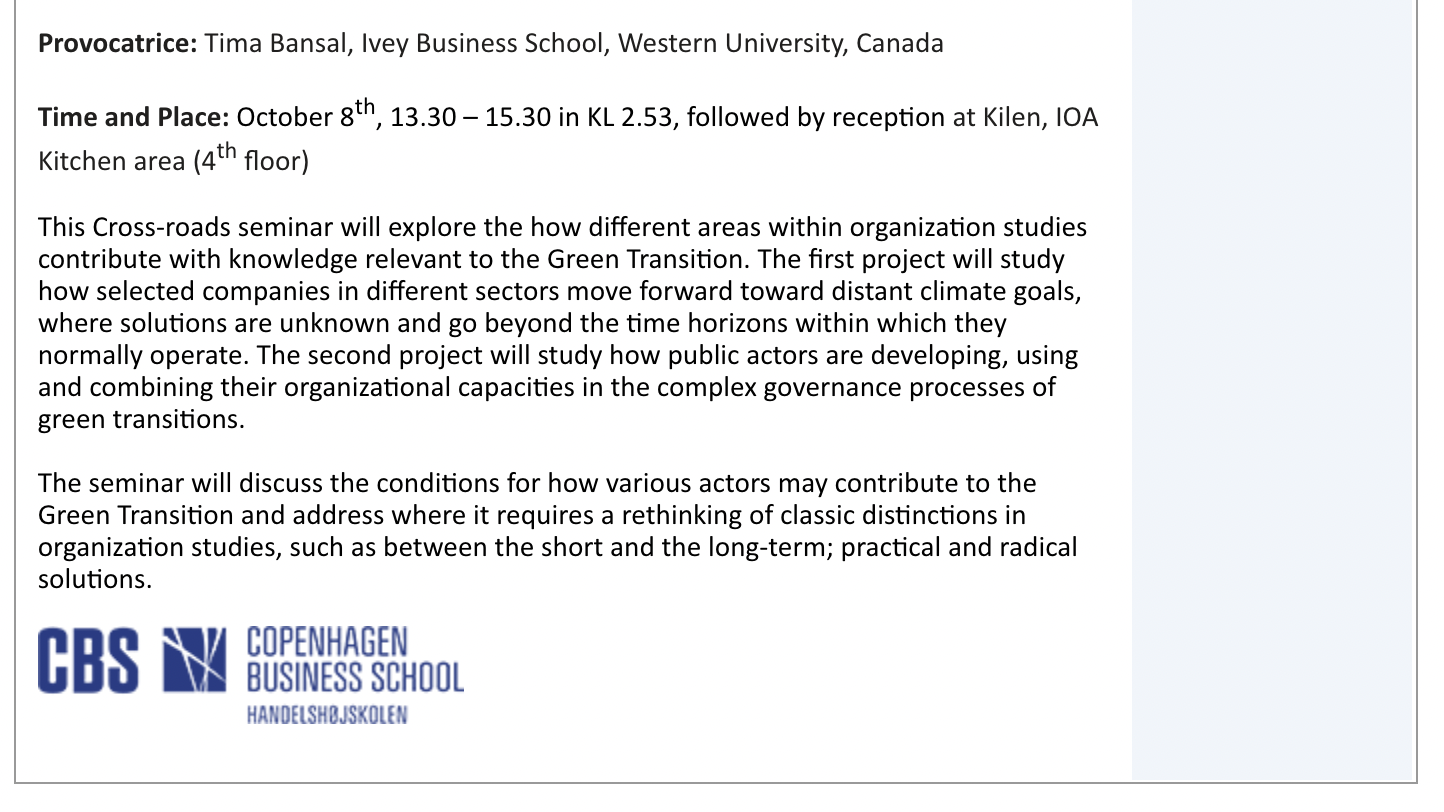
Natalie Slawinski - @bout Time Webinar
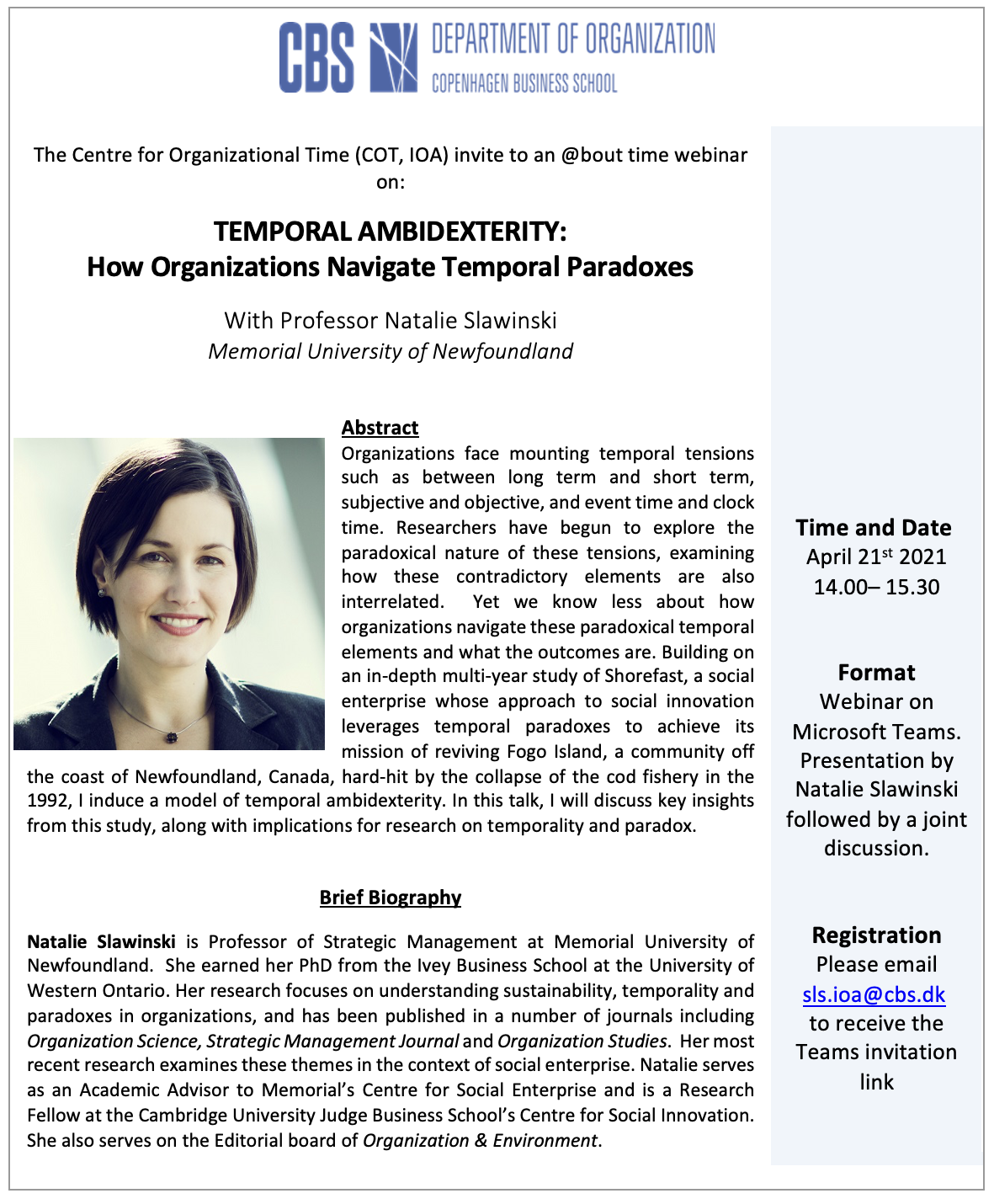
Innan Sasaki - @bout Time Webinar
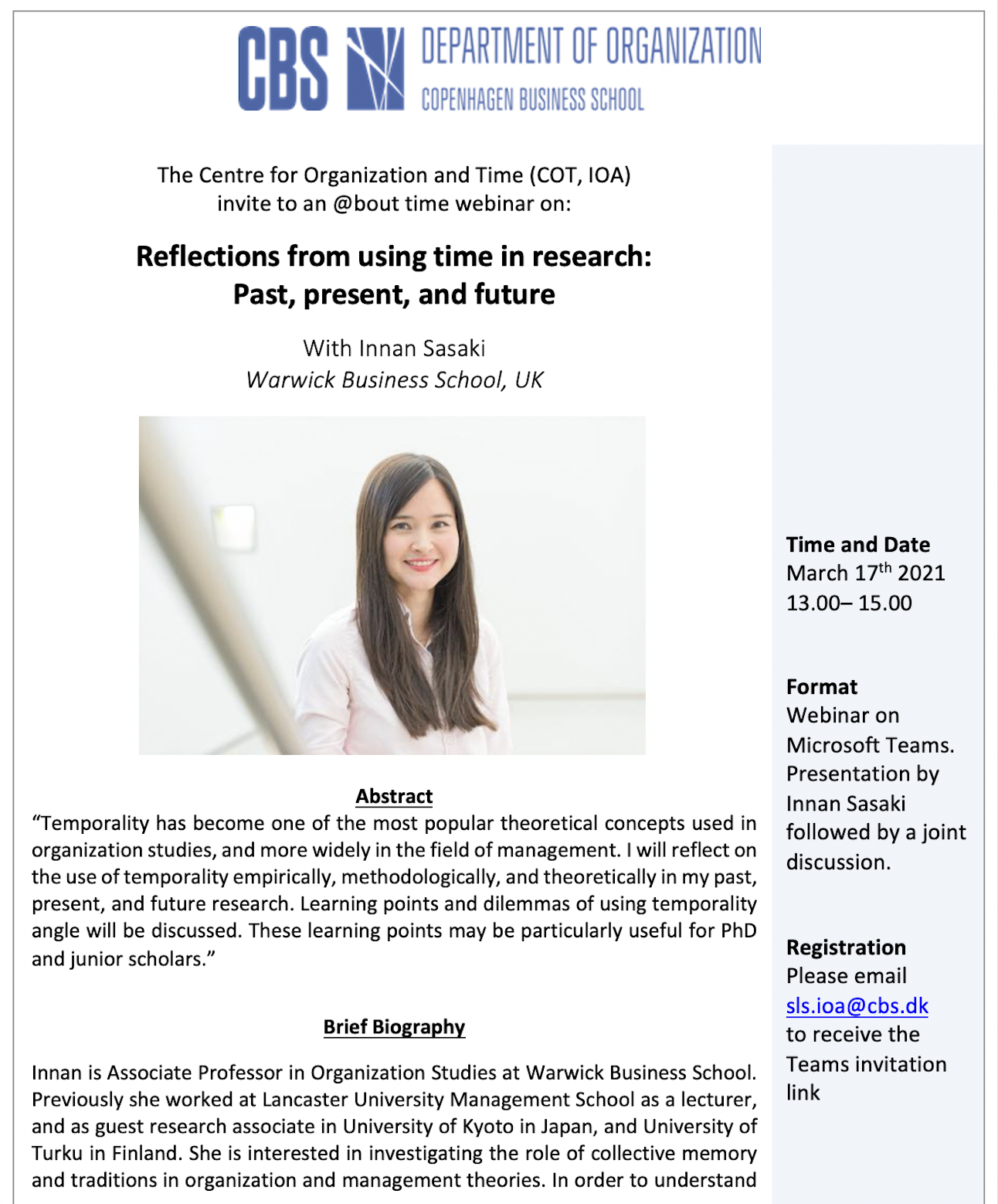
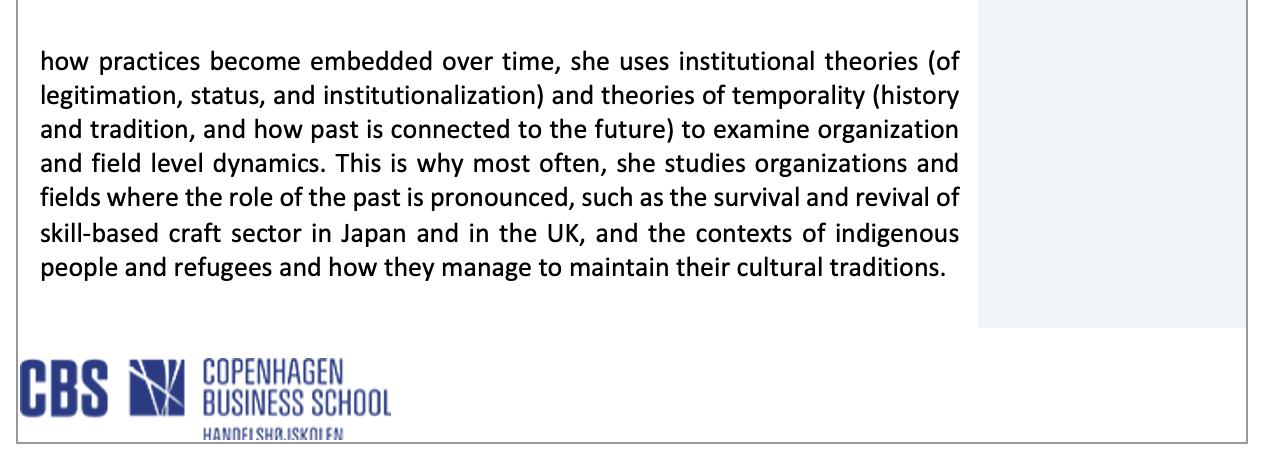
Daniel Geiger - @bout Time Webinar
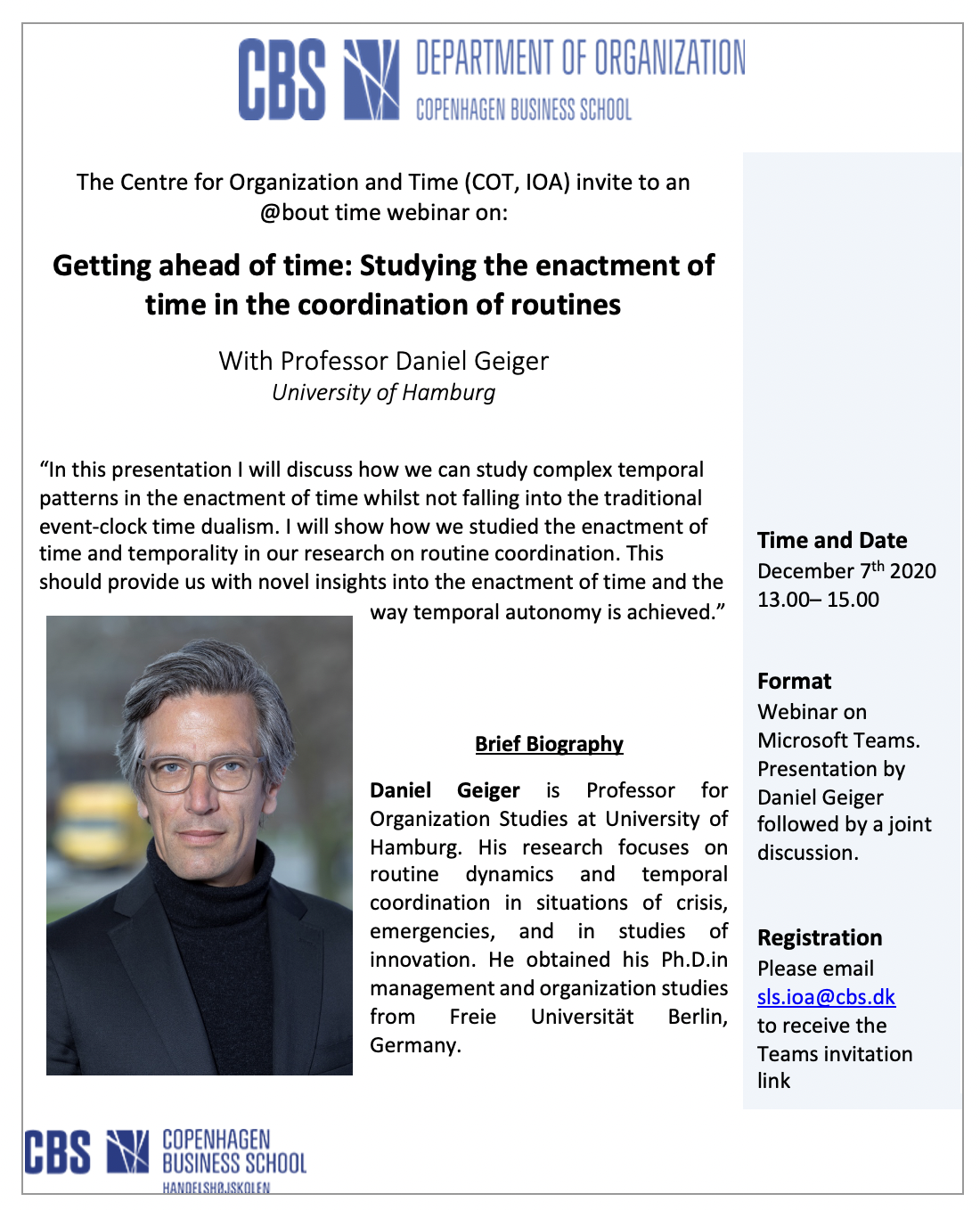
Nicolas Bencherki - @bout Time Webinar
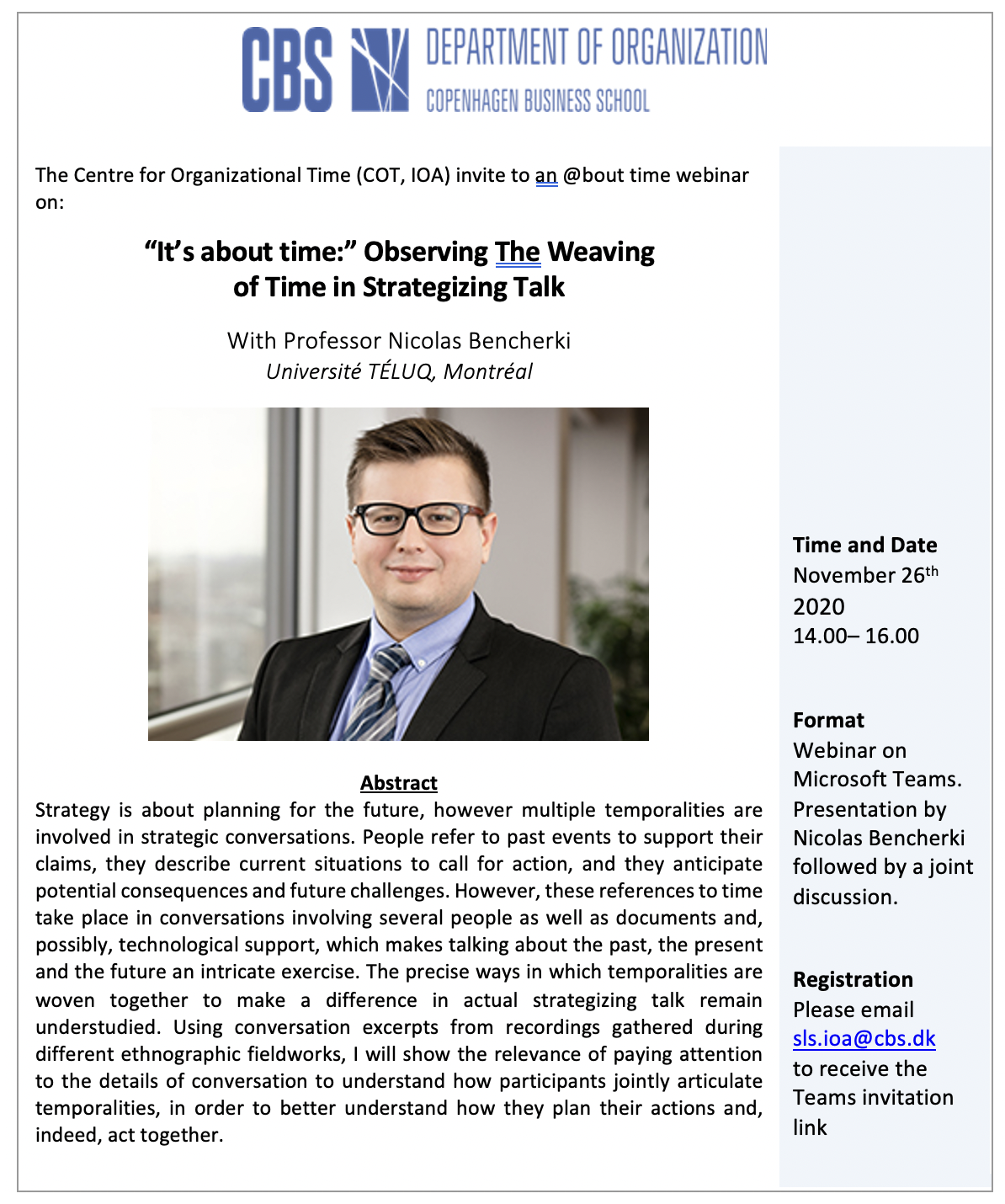
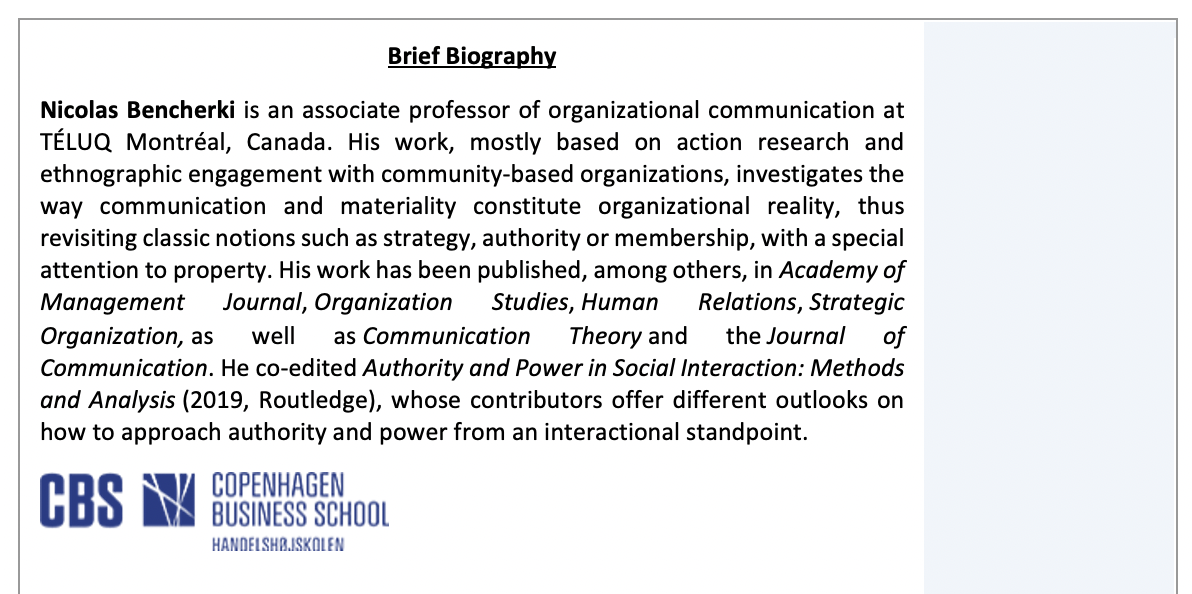
Jonatan Pinkse - @bout Time Webinar
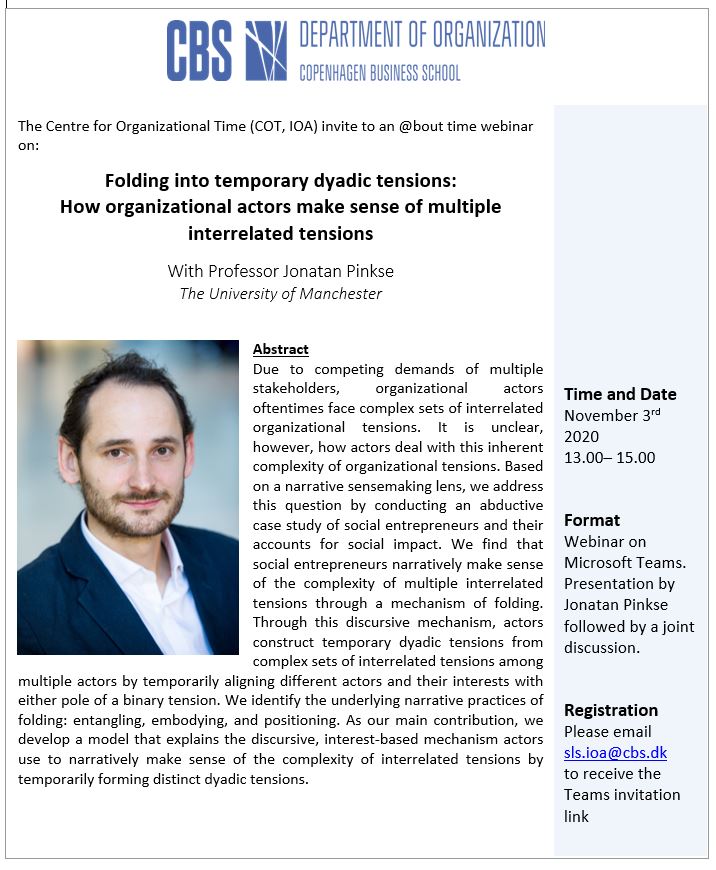
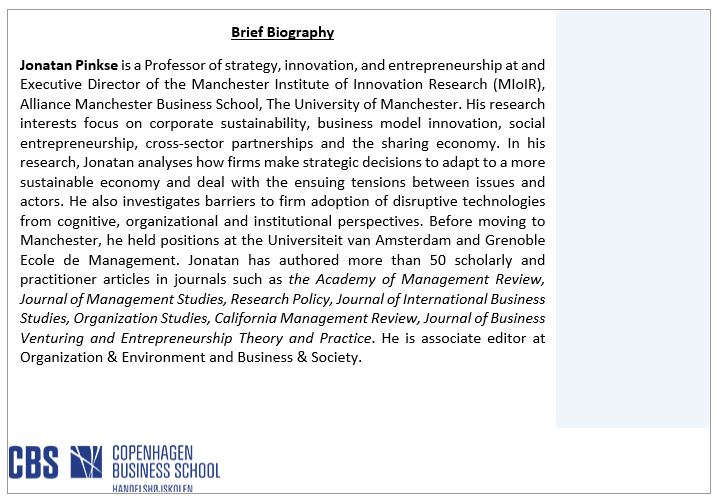
Tima Bansal - @bout Time Webinar
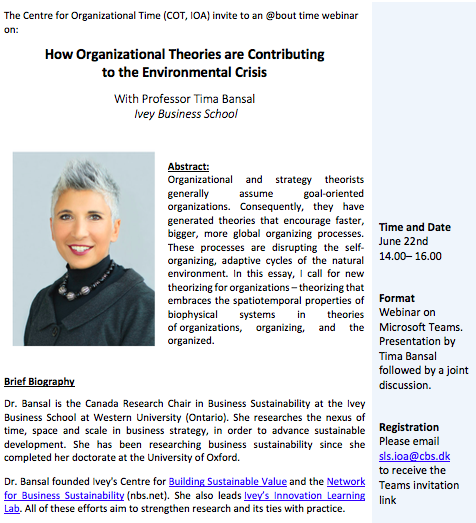
Ann Langley - @bout Time Seminar
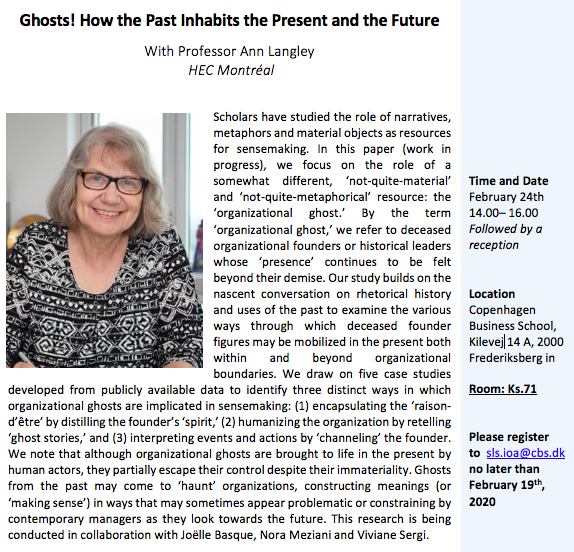
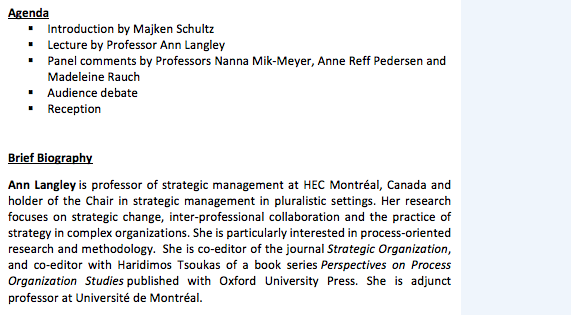
2019
PhD defense: Vibeke Kristine Scheller successfully defended her ph.d. thesis
November 2019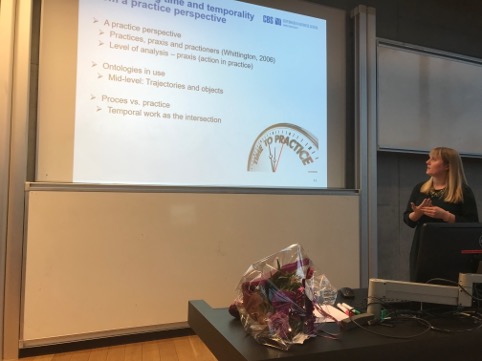
Vibeke Kristine Scheller succesfully defended her ph.d. thesis entitled " The temporal organizing of same-day discharge: A tempography of a Cardiac Day Unit "
Abstract: Same-day discharge is a recent trend and a challenge for hospital managers both in Denmark and internationally. This dissertation investigates the intersection between time and organizing in a specific Cardiac Day Unit and shows how the tensions, that professionals and patients face, relate to different representations of time. The papers in the dissertation present how a multiplicity of temporal perspectives coexist in the cardiac Day Unit and affects day-to-day organizing, i.e. managing patient trajectories, conducting temporal work and utilizing temporal boundary objects.
Primary supervisor: Professor mso Anne Reff Pedersen, IOA
Secondary supervisor: Professor Tor Hernes, IOA
Assessment Committee:
- Professor Silviya Svejenova Velikova (Chair), IOA.
- Professor Gerry McGivern, Warwick Business School
- Senior Researcher Dr Katja Maria Hydle, NORCE Norwegian Research Center
Thesis: The thesis is available at CBS Research Portal
Hari Tsoukas - @bout Time Seminar
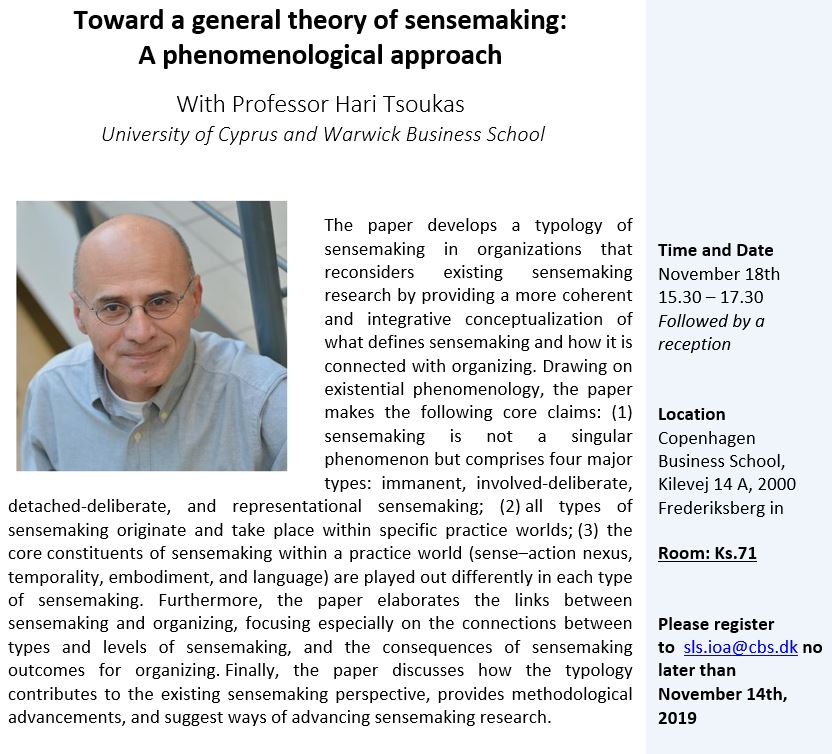
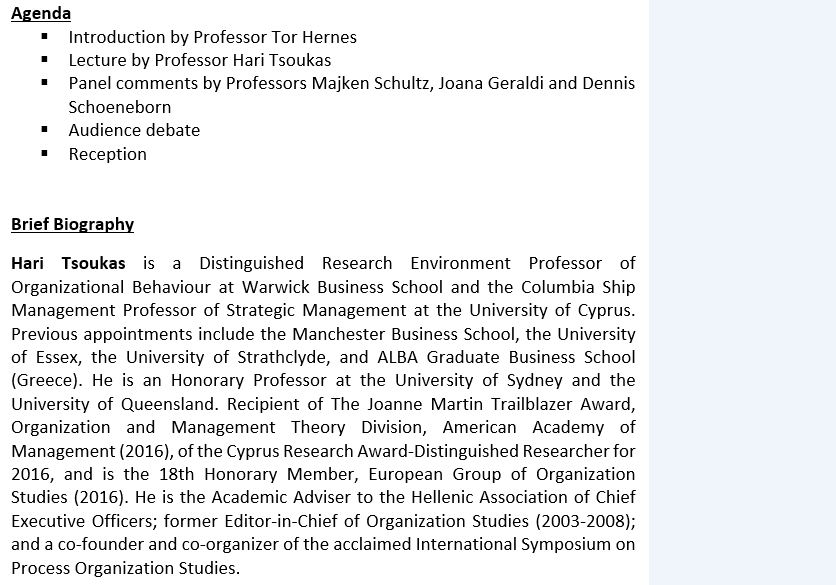
Juliane Reinecke - @bout Time Seminar
Majken Schultz published together with Oriol Iglesias and Nicholas Ind an article in Business Horizons
October 2019
History matters: The role of history in corporate brand strategy
ABSTRACT
This article explores how an organization can use its history to define and deliver its corporate brand strategy. We specifically look at Adidas, which, having rejected its history at one stage, rediscovered and used the philosophy and ideas of its founder to provide direction for the future, legitimate strategic choices, and enrich the corporate brand. Through analysis of material evidence and interviews with senior and long-serving employees, we conceptualize the way Adidas developed a systematic approach to the use of history in its corporate brand strategy by creating the means to uncover, remember, curate, and then embed it. Combining the lessons of the Adidas case with evidence from other cases in which history was used to refocus and revitalize corporate brands, we deliver key recommendations for managers.
Marc Stierand - @bout Time Seminar
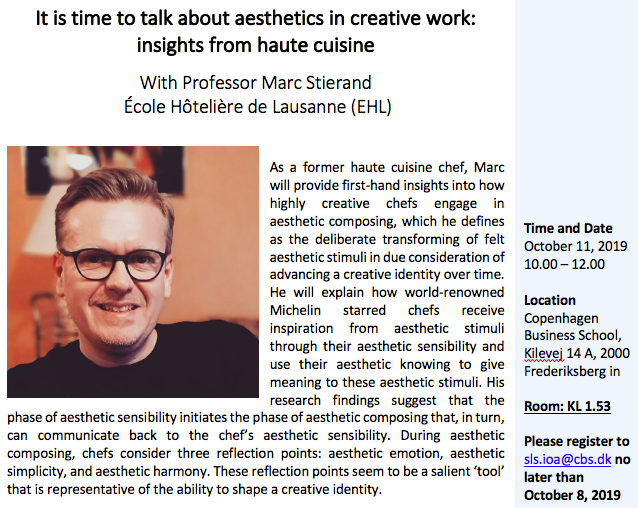
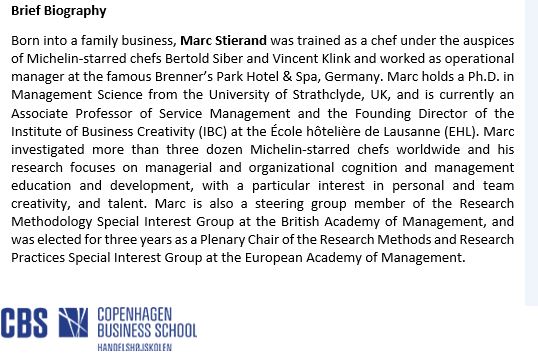
A Conversation with David Boje
September 2019
Monday 26 September 2019 Centre for Organizational time invited to informal conversation with David Boje about his ideas related to time, narrative, storytelling and materiality.
David Boje is an influential thinker in the area of Organization Studies who is particularly well known for his work on story-telling as constitutive of organizations.
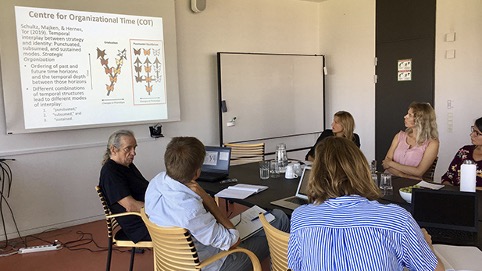
Daniel Nyberg - @bout Time Seminar
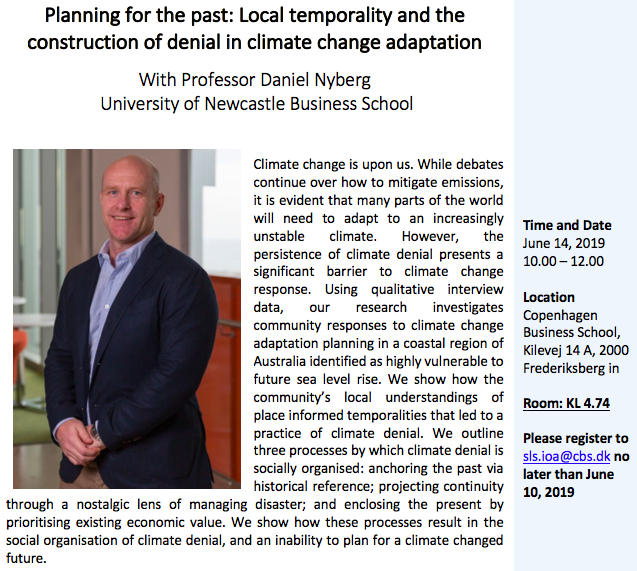

David Obstfeld - @bout Time Seminar
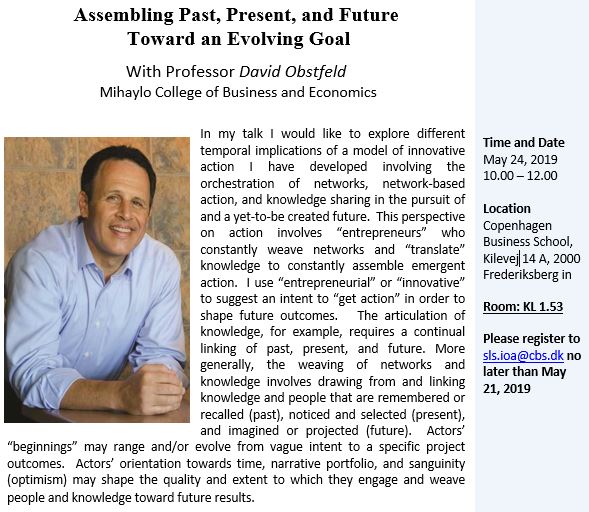
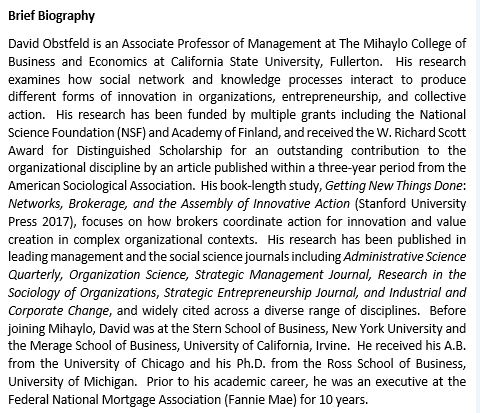
Silviya Svejenova published together with Barbara Slavich, M. Pilar Opazo and Gerardo Patriotta a paper in Organization Studies
April 2019
ABSTRACT
This study examines innovators’ efforts to conceptualize and communicate their novel work through categorization. Specifically, we view category formation as a controversial process of meaning making, which we theorize through the concept of “politics of meaning” and operationalize through a social semiotics approach. By analyzing the labeling controversies underlying a new culinary style publicized as “molecular gastronomy”, we find that innovators’ efforts at categorization unfold along four consecutive stages: experimenting with a new style, communicating the new style, contesting the dominant label, and legitimating the category meaning. Our study suggests that a new category’s dominant label can substantially deviate from the innovators’ intended denotations, yet nonetheless bring that category forward by triggering public negotiations around its meaning, which lead to categorical deepening and legitimation. By putting forward a “politics of meaning” view on categorizing innovation, this work advances our understanding of the connection between labeling and category formation in the context of innovation.
Majken Schultz and Tor Hernes published a paper in Strategic Organizaiton
April 2019
Temporal interplay between strategy and identity: Punctuated, subsumed, and sustained modes. 
ABSTRACT
Although strategy and identity are recognized as exhibiting different temporalities, research has yet to show how their temporal differences influence their mutual interplay. Based on a longitudinal case study, we make three contributions to understanding how temporal differences influence the interplay between strategy and identity. First, we articulate their temporal differences as differences in temporal structures, defined as the ordering of their past and future time horizons and the temporal depth between those horizons. Second, we show how different combinations of temporal structures lead to different modes of interplay, which we label “punctuated,” “subsumed,” and “sustained.” Third, we show how sustained interplay happens when strategy includes multiple horizons and greater temporal depth, while identity has more defined horizons and a temporal depth spanning the distant past and future. In a sustained mode of interplay, strategy is meaningfully framed by identity, while strategy serves to enact identity. These findings, we argue, have major implications for how organizations can comply with short-term business cycles while addressing long-term concerns.
Stéphanie Dameron - @bout Time Seminar
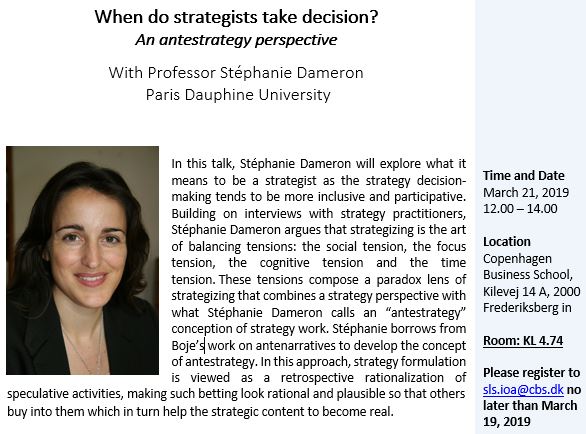
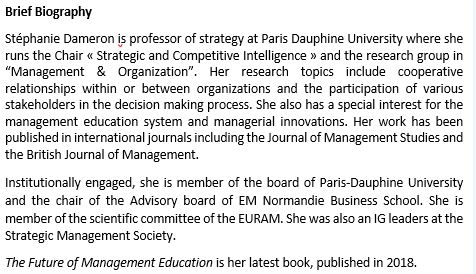
Dr. Blagoy Blagoev - @bout Time Seminar
Leuphana University of Lüneburg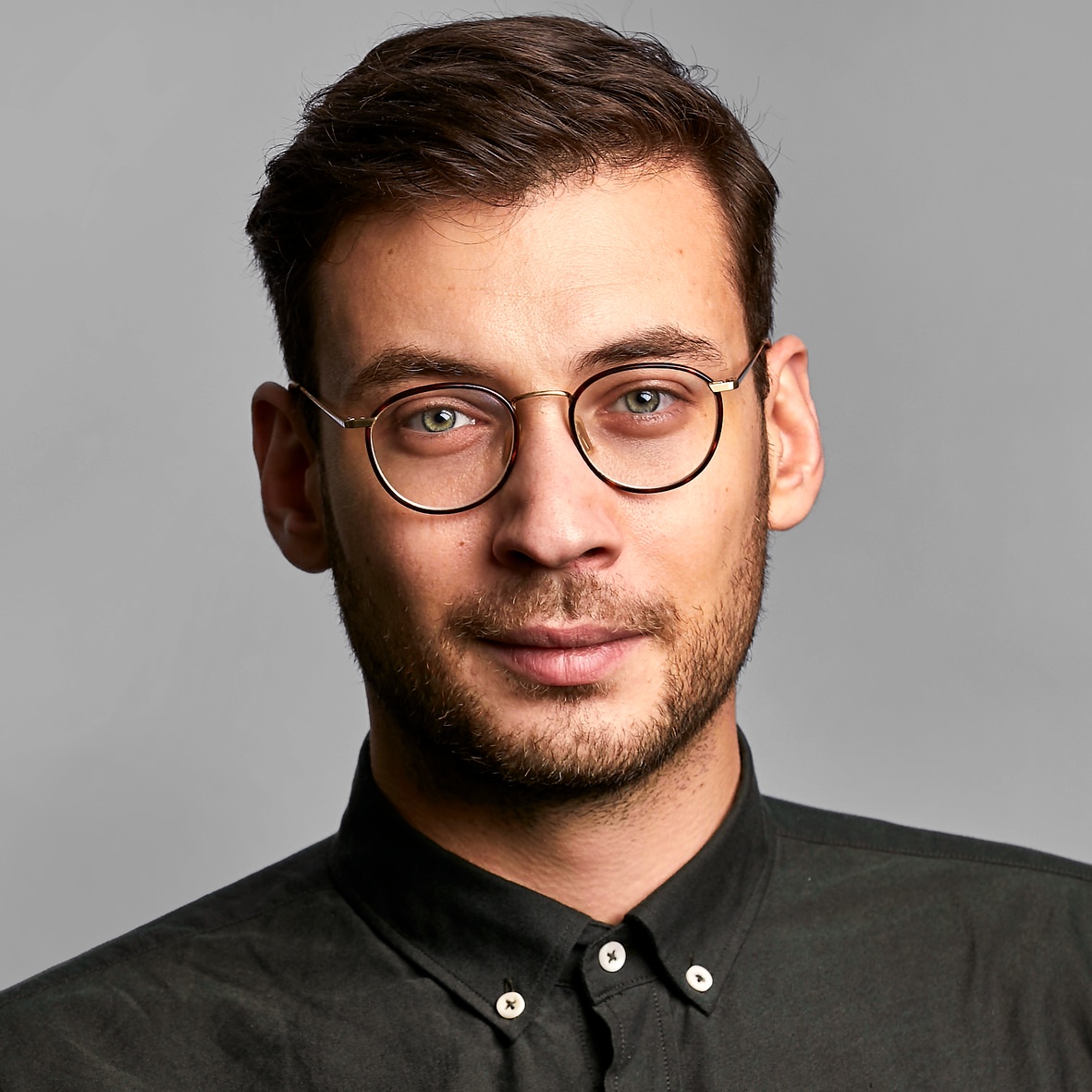
How do extreme work hours persist?
Temporal uncoupling as a new way of seeing
Information about the event
Date: Wednesday 20th of February 2019
Time: 13:00-15:00
Location: Copenhagen Business School, Kilevej 14 A, 2000 Frederiksberg - KL 4.74
Organized by: The Centre for Organizational Time
Abstract
Extreme work hours constitute a peculiar temporal phenomenon: a temporal structure that persists in a state of asynchrony relative to deeply entrenched societal rhythms, such as the 40-hours work week. In his talk, Blagoy Blagoev will examine the dynamics and the effects of this asynchrony. For this, he will draw on a longitudinal case study of the genesis, reinforcement, and maintenance of extreme work hours in an elite consulting firm. To theorize his findings, Blagoy borrows from Luhmann’s theory of social systems and develops the notion of temporal uncoupling. Not only does this notion offer a new way of seeing the persistence of extreme work hours as a temporal problem, it also furthers current theorizing on organizational temporality. More specifically, temporal uncoupling reveals the paradoxical co-constitution of synchrony and asynchrony in organizations and, thus, challenges the orthodox view of entrainment as an ideal temporal relation between organizations and their environments.
Brief Biography
Dr. Blagoy Blagoev is Lecturer in Organization Studies at Leuphana University of Lüneburg, Germany. Blagoy holds a doctoral degree from Freie Universität Berlin and his work focuses on the interplay of time and temporality with processes and practices of organizing. Among other things, he has conducted research on the formation and persistence of organizational time regimes, the temporal coordination of organizational routines, and the entanglement of organizational remembering with materiality. Currently, Blagoy is studying the temporal structuring of work in new forms of organizing.
Registration
Please register to sls.ioa@cbs.dk no later than February 18, 2019
New Book Release: Tid til Velfærd? (English: 'Time for Welfare?')
January 2019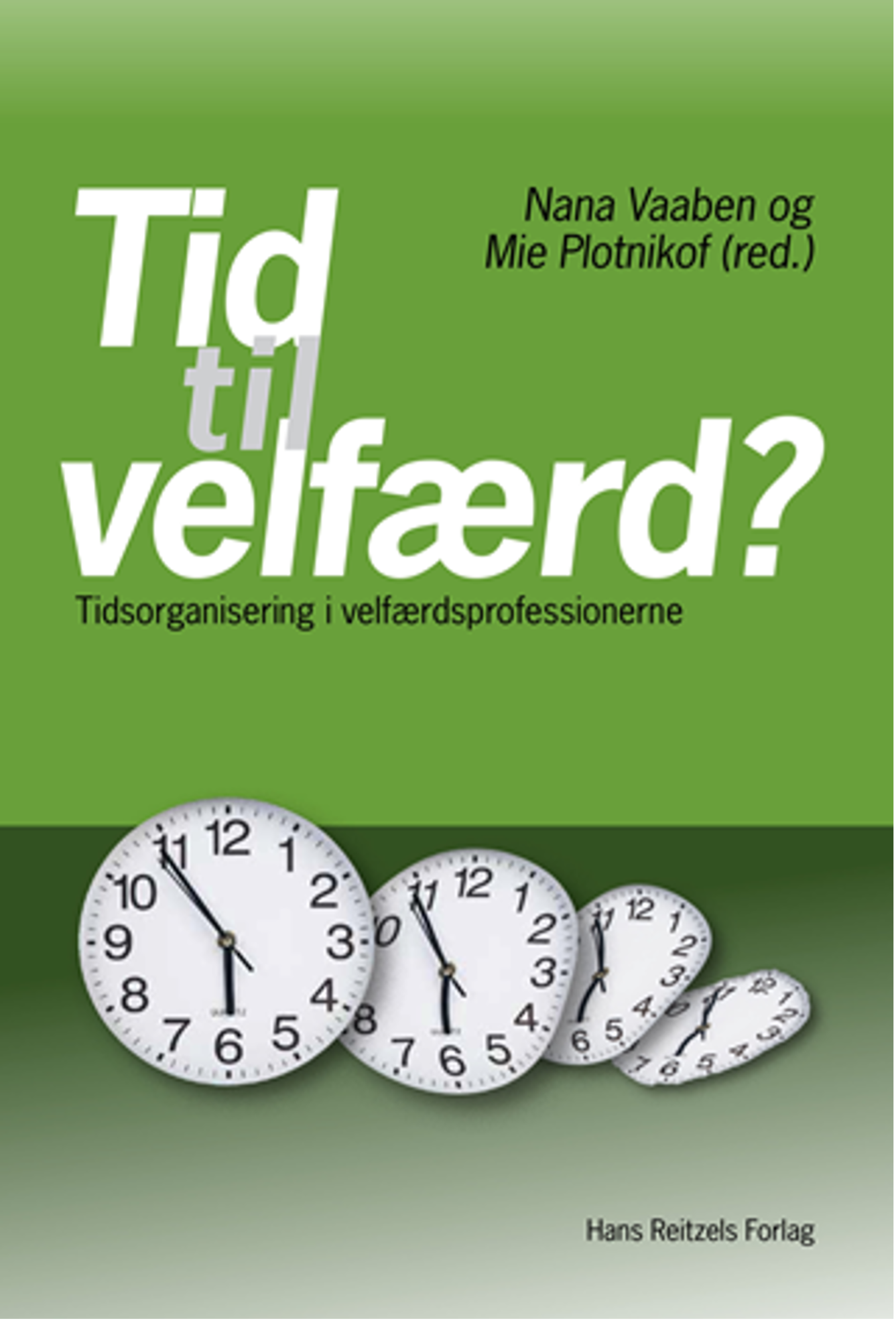
'Tid til Velfærd?' (Edited by Mie Plotnikof and Nana Vaaben, including chapters by CBS researchers Anne Reff Pedersen and Vibeke Scheller) is a new book about time in the welfare professions - ie. how welfare work is organized in time and how it is organized through different structures of time. This book helps to put into words some of the many different temporal understandings and constructions that characterize the organization of welfare work. Each chapter presents a special analytical concept of time and shows how one thereby can spot specific facets of the welfare work's temporality.
Miriam Feuls successfully defended her ph.d. thesis
January 2019
Miriam Feuls successfully defended her thesis in order to obtain the academic degree of Doctor of Philosophy (Dr. phil) on Thursday, January 31 at the University of the Arts Berlin. Within her dissertation project “Praktikenbasierte strategische Frühaufklärung: Identifikation innovativer Bereiche zur Weiterentwicklung von Geschäftsmodellen” she developed a method that by taking a practice perspective sensitizes strategic foresight for the interplay between past experiences, present realities and future trajectories (inside and outside the organization) inspiring new opportunities for business modeling.
Professor Philippe Lorino - @bout Time Seminar
ESSEC Business School, France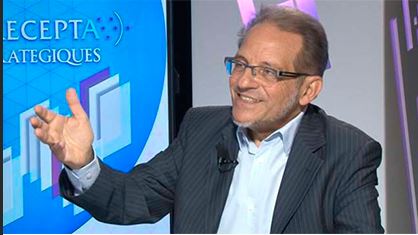
Philippe Lorino is a distinguished Emeritus Professor of management control and organization theory at ESSEC Business School, Paris.
Professor Tor Hernes awarded Honoray Doctorate at EBS Estonian Business School in Tallinn
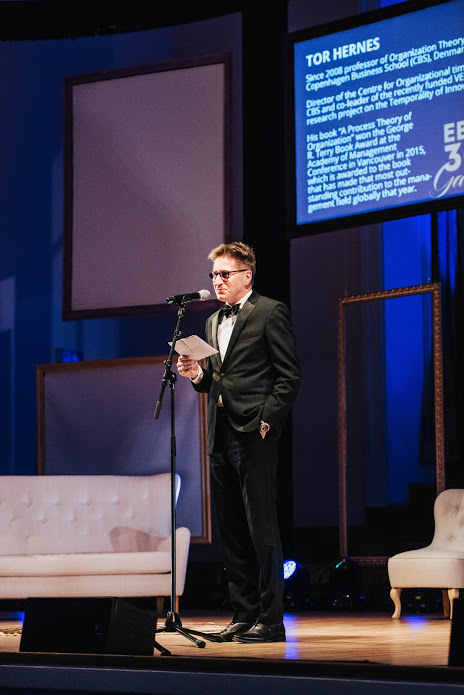
Professor Tor Hernes is appointed as Honoray Doctorate at EBS Estonian Business School in Tallinn. The appointment was part of a grand gala celebrating the school's 30th anniversary. Link to Estonian Business School: https://ebs.ee/en
Christina Lubinski has published on "Contextualizing the uses of the past" in Organization Studies
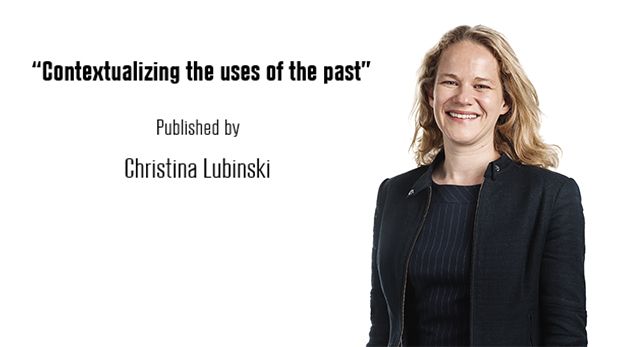
Abstract
Research has made great strides in understanding how and why organizational actors use the past. So far, scholars have largely focused the level of analysis on the organization, without exploring the intertwined nature of historical claim-making with the organizational field or society at large. This article extends the status quo by conceptualizing the role of context for organizational uses-of-the-past. It identifies three key aspects of context that shape how history contributes to the social construction of reality: the existence of multiple audiences, the landscape of pre-existing historical narratives and the experience of social practices giving credibility to historical claims.
By analysing the historical case of German business in colonial India, the paper makes three broader claims that could move research toward a more contextualized conception of the uses-of-the-past: (i) historical claims are validated in a continuous dialogue with multiple audiences; (ii) they revise previously existing narratives by critiquing or ‘outpasting’, i.e. invoking earlier origins; (iii) they often result in ‘rhetorical frictions’ that require continuous and skilful history revisions to mitigate emerging conflicts in their reception. By contextualizing the uses-of-the-past in this way, the paper moves beyond ‘hypermuscular’ organizational actors bending history to their will and foregrounds the situated nature of historical rhetoric.
Lubinski, C. (2018). From ‘History as Told’ to ‘History as Experienced’: Contextualizing the Uses of the Past. Organization Studies, 39(12), 1785–1809
Inauguration Event for COT
Welcome to the inauguration event for centre for organizational time

Drawing on insights from various scholars at CBS and elsewhere, the Centre aims to be a hub for thinking about organizations and time. The main focus of the centre will be on how organizational actors enact their near and distant pasts and futures and how that enactment shapes processes, practices and policies in, between and around organizations.
Until 18.00: Mingling time and drinks
